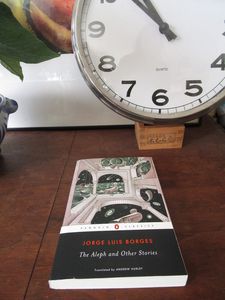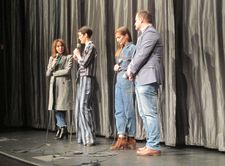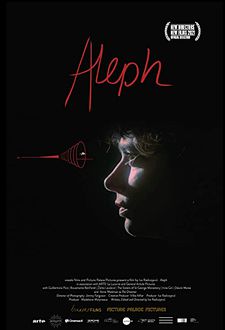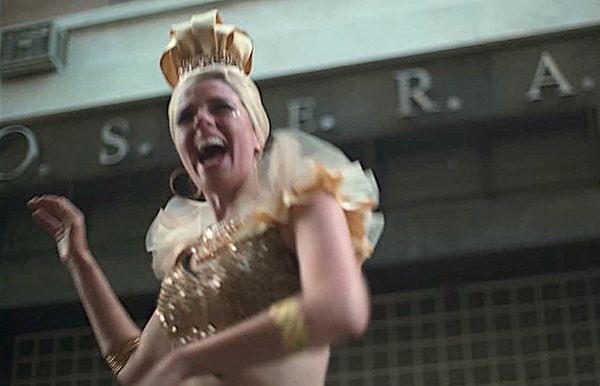In the second instalment with Aleph director Iva Radivojević (editor of Celia Rowlson-Hall’s MA and Derek Lam’s 10 Crosby shorts) we discuss choosing Anne Waldman as the narrator, a book by Mohammed Dib, being a big fan of Alain Resnais films, going into a world of eyes, Jorge Luis Borges and mirrors.
The woman who disappears into the painting feels strangely related to the old couple who befriend and haunt Naomi Watts in David Lynch’s Mulholland Drive, only to appear downsized out of a paper bag later on. An ad for Jim Jarmusch’s Paterson graces the back pages of a newspaper in Buenos Aires and Oscar Wilde’s Happy Prince is not the only one who is able to see without eyes.
Masa Dakic and Žarko Laušević sit in a diner and discuss what it would mean to be informed that a moment in your life is going to be the happiest while it happens. In a monastery nuns watch a billowing curtain. In the Himalayas monkeys come and go. Her face framed by her own arms, a woman in Kathmandu takes up the body language and emotional strands we encountered earlier in Argentina.
Off we race in a snowmobile to a radar station in Greenland, while crows carry messages to eternity. As “time passes differently in each place,” we meet a ghost on a train to Bangkok, who becomes our next guide on a boat ride with the mist rising blue from the waters. Twins or doubles (Desire Marea) in matching zebra suits invite us to tea and all the eyes of Mexico stare back until we finally reach the vortex. The spiral takes us in, where a giraffe, a zebra, an antelope await, together with flamingos, fishes, an elephant, and - lo and behold - the woman who disappeared into the painting so many moons ago.
Films and references to cultural traditions may flicker past your inner eye in Aleph, a luminous take on Borges, which was a highlight of the 50th anniversary edition of New Directors/New Films.
 |
| Iva Radivojević: “There was something so powerful about people allowing me to film their eyes.” |
From Upstate New York on the afternoon of the 93rd Academy Awards, Iva Radivojević joined me on Zoom for an in-depth conversation on Aleph.
Anne-Katrin Titze: The eyes in Mexico are a fascinating piece of cinema because you realise how much you look at eyebrows and lashes and everything around the eyes.
Iva Radivojević: Or what they are looking at, the reflections in the eyes, yeah. When I was in Thailand, this myth about eyeballs kept coming up. And as I need to look for clues in each place to drive into the next location, this idea of eyes started kind of taking hold of me. I had read this essay on surrealist cinema and there was a sentence about living in a place inhabited by hands. And I thought - what a fantastic image! I took that and converted it to eyes.
So we’re just going to go into a world of eyes. But also, as Borges is dealing with mirrors as one of his themes - actually, he’s terrified of mirrors - the eyes also serve as mirrors. In Aleph there’s a quote saying “I saw millions of mirrors staring at me and none of them reflected me.” So of course we were going to go into this realm.
 |
| Irina Giri and Namita Kandel in Aleph |
That was Mexico and there was something so powerful about people allowing me to film their eyes. There’s an exchange that happens, which was “I see something in your eyes, I would really love to film them.” Immediately, they feel seen and they allow me in. And I’m not revealing anything else but that (Iva puts her hands to her eyes, forming finger glasses). It was a very beautiful process, I think, for both people.
AKT: And you managed to sneak a clown face in there! Your sense of humour always seeps through. It’s the deepest thoughts and then - boom - there’s clown face in the middle. I love when a film can do that. “If I had no eyes, I would still see” is one of the quotes. It made me think of Oscar Wilde’s story The Happy Prince.
IR: I don’t know it.
AKT: It’s a fairy tale about a rich prince who, when alive was too happy to see any suffering. After he dies, he becomes a statue and sees all the suffering in the town. He befriends a little bird and tells him to take his eyes, which are sapphires, and bring them to the people. Once he sees, he blinds himself and can still see.
 |
| Iva Radivojević quoting from Jorge Luis Borges’s The Aleph: “I saw millions of mirrors staring at me and none of them reflected me.” Photo: Anne-Katrin Titze |
IR: I’m going to find this tale!
AKT: That’s what it reminded me of, seeing and empathy.
IR: Yes, when I was in Mexico, I had actually spent time with a woman who was blind. Her story didn’t make it into the film, but it informed that line. And of course, Borges was blind as well. It’s the idea that it’s just a different way of seeing. Again, it’s referencing back to Borges and previous aspects of the film. But I’m going to find that story, it sounds really beautiful.
AKT: You chose Anne Waldman as your narrator. How did that come about?
IR: We were thinking long and deep about who this person should be because the voice-over is kind of a spiritual being outside of space and time. In Borges’s writing he has this dreamer who devises the whole universe and only allows us little glimpses into the mythical. We’re trying to grasp it all the time but we’re only allowed small glimpses. So this dreamer has devised the entire film, let’s say. I always knew it was going to be a female voice.
If we think about fairy tales and storytelling, it’s always usually an older woman who is carrying on this mission. I felt that Anne is a sorceress in a way, right? She did dream up worlds, she dreamt up Naropa, many different things. Her legacy as a poet as well. She was extremely gracious to work with. When I first got on the phone with her, it was in the middle of the pandemic and we were talking and we entered the past, the present, the future - everything was compressed in one moment. It was one of the most beautiful 30 minutes I had spent talking to somebody. It felt so right for the film.
AKT: “A place is only a memory.” That’s quite a line! It actually made me think of Alain Resnais’s films. Different snippets - but this is what his films are very much about.
 |
| Anne-Katrin Titze with MA director Celia Rowlson-Hall, editor Iva Radivojević and DP Ian Bloom at IFC Center Photo: Ed Bahlman |
IR: I’m a big fan of his films. That line - I was reading a book by Mohammed Dib, who’s an Algerian writer, and it was a book of photographs and texts about his old childhood home. It’s a very beautiful little booklet and he talked about a place being a memory. And, the same, I was very attracted to the idea. Of course, Algeria itself, I don’t even know how to talk about it, but that village where we were filming existed in multiple dimensions. It felt appropriate as a memory of so many different times.
AKT: You must have just managed to get all the filming done right before the pandemic hit. Is it that? It feels last second. If the pandemic had happened earlier, the film would not be there.
IR: Yeah, we finished in the fall of 2019. I guess in China it was already kind of happening that year. But yeah, it was really lucky and we entered the editing phase when the world changed forever.
AKT: It informs the film now. The audience with our experience of being holed up in the place we were at and then seeing all this traveling - it does feel like good timing, as opposed to some films where it really is bad timing. I think we need this now.
IR: I think you’re right. I also think last year, I don’t know if we were ready for it, because it was a much more intense and frightening time. Now things are sort of shifting a little bit. Also the film points at the pluriverse. I feel in this pandemic that also became a bit obvious, the interconnectedness of all things.
 |
| Aleph poster |
AKT: It’s so nice to catch up with you again after our MA Q&A at the IFC.
IR: So long ago!
AKT: So long ago and all about the American West! Great to see you again.
IR: Thank you so much and thank you for your wonderful questions. It’s really a pleasure to talk with somebody who is asking questions that are enriching for me.
AKT: Thank you so much.
Read what Iva Radivojević had to say on a reference to David Lynch and a scene in Mulholland Drive, Luis Buñuel’s The Phantom Of Liberty, Apichatpong Weerasethakul's Uncle Boonmee Who Can Recall His Past Lives and Luminous People (segment in State of the World), Likes and Dislikes by Roland Barthes, and Andy Warhol.
Aleph screened on Friday, April 30, 2021 and Tuesday, May 11, 2021 inside the Walter Reade Theater at Lincoln Center. There was a pre-recorded post-screening Q&A.
The 2021 feature committee comprises Florence Almozini (Co-Chair, FLC), La Frances Hui (Co-Chair, MoMA), Rajendra Roy (MoMA), Josh Siegel (MoMA), Dan Sullivan (FLC), and Tyler Wilson (FLC), and the shorts were programmed by Brittany Shaw (MoMA) and Madeline Whittle (FLC).
New Directors/New Films at 50: A Retrospective was free virtually through April 28, 2021.
The 50th anniversary edition of New Directors/New Films ran from April 28, 2021 through May 8, 2021 with the in-person screenings at Lincoln Center extended to May 13, 2021.























